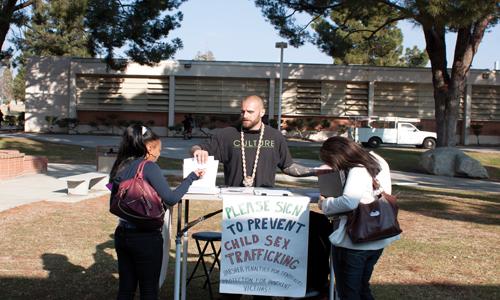In the opening week of the spring semester, the Free Speech Area, located in front of the Campus Center, was flooded with booths set up for jewelry and craft vendors, banks, gyms, and petitioners.
The vendors and various companies present themselves with clear agendas. Petitioners, as common as they are, all around town in any highly populated area, seem to be more ambiguous.
Petitions can be used to veto a bill, recall or place in the running an official, or give a bill the potential chance of ending up on a ballot. These signatures cannot legally be used for anything else.
The majority of petitioners are hired by independent companies and treat petitioning as a job as they are paid per signature. However, this is not always the case, as it reads on the petition, “This petition may be circulated by a paid signature gatherer or a volunteer. You have the right to ask.”
The statistics, according to Debbie Tharp, a petitioner for Panda Petitions, are that untrained volunteers collect only 30 to 40 percent of usable signatures where a trained petitioner averages 75 percent of viable signatures.
Jeffrey Durell could be considered a veteran petition circulator, having done so on and off for the past 19 years, and although he is employed and paid per signature by H & H Petition management, an independent California based company, he says that he petitions “to make sure important issues make it on the ballot.”
“People don’t understand that if they don’t care enough to sign the petition it won’t make it to the ballot and they wont have the chance to vote on it,” said another petitioner Mike Bullock.
Some students didn’t even notice the petitioners, while others like Cynthia Peterson did, but didn’t sign because she said she just didn’t have time rushing between classes.
For students like Rocio Rodriguez, the petitioners came up and informed her on the issue before she signed.
“Child sex trafficking caught my attention, it’s just disgusting,” said Alfred Cadena about his reasons for signing.
Like with any job, there comes a level of professionalism. Petitioners are absolutely not allowed to offer any sort of compensation for a signature and petitioners may not impede the flow of foot traffic or corner a potential signer. They are also required to confirm that the signer is legally registered to vote. If the signee is not registered as an eligible voter at the correct address then the signature does not count.
Petitioners can register you to vote, but unlike signatures for their initiative, they receive no payment for doing so.
It is also the job of the petitioner to properly inform the public on the issue they would be signing on.
There have been reports of petitioners venturing out from the Free Speech Area, and Tharp seemed disgusted at the idea of petitioners scouring the parking lot for signatures, saying, “Scouring the parking lot is a huge no-no, we have a reputation to uphold.”


